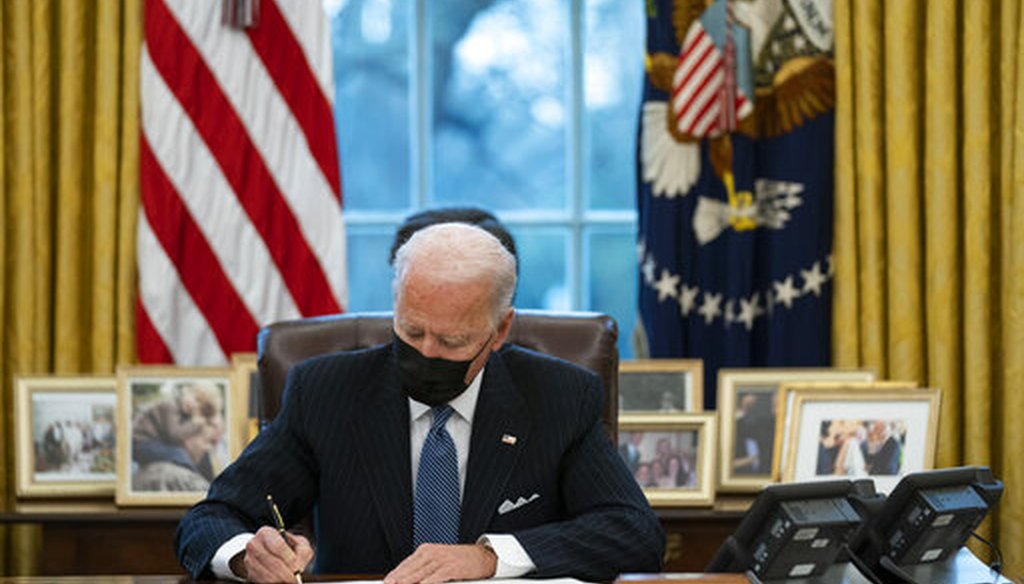Stand up for the facts!
Our only agenda is to publish the truth so you can be an informed participant in democracy.
We need your help.
I would like to contribute

President Joe Biden signs an executive order in the Oval Office on Jan. 25, 2021,. (AP)
Joe Biden has only been president for a couple of days, but already his critics on social media are saying the country has fallen apart during his tenure.
A reader pointed us to a Facebook post dated Jan. 24 that promised to "take a look at the Biden/Harris administration" and what it had done in its first few days. The post was also flagged as part of Facebook’s efforts to combat false news and misinformation on its News Feed. (Read more about our partnership with Facebook.)
The post said, "2pm yesterday marked Biden's 50th hour in office. How are all of my liberal friends feeling?" It concluded, "Everything they've done in THREE DAYS has benefited other countries and hurt Americans."
The post made 16 different assertions about Biden’s first actions. Many exaggerated the effect of what he did or accused him of taking steps that he never took.
This needs context.
It refers to Biden’s cancellation of necessary federal approvals to construct the Keystone XL pipeline from Canada to Nebraska. Social media claims have cited the 11,000 construction jobs and 42,100 other jobs, which would combine to 52,100.
The 11,000 figure is one that has been published by the company, though most of these jobs would be temporary.
In the meantime, the 42,100 figure is close to one cited in 2014 in an 11-volume State Department analysis. However, this merits a big asterisk: The State Department defined "job" as "one position that is filled for 1 year," meaning that most of those jobs would be temporary. Another asterisk is that it includes estimated indirect jobs that support the construction workforce and are not "in oil."
The State Department projected that no more than 50 jobs, some of which could be located in Canada, would be required to maintain the pipeline. Thirty-five of them would be permanent, while 15 would be for temporary contractors.
This is speculative at best.
In 2019, the last year for which full data is available, energy production in the United States exceeded U.S. energy consumption on an annual basis for the first time since 1957, according to the federal Energy Information Administration. This is a common definition of "energy independence."
However, it’s not guaranteed that the U.S. will slip out of energy independence due to anything Biden has done or is planning to do.
In addition to blocking the Keystone XL pipeline, Biden’s executive order on climate change put a temporary moratorium on oil and gas leasing in the Arctic National Wildlife Refuge. Biden has separately pledged to block new fracking — a method of natural gas extraction criticized by environmentalists — on federal lands, though not on private lands.
These policy changes could eventually expand the amount of energy produced in the United States, but Biden didn’t ban any current production — any new production from the avenues he closed off would have taken years to materialize. So it’s impossible to say that any of Biden’s changes would reduce current production levels below U.S. consumption needs.
This is partially accurate.
Texas wasted little time in suing the Biden administration over a plan to freeze deportations for 100 days as long as the individual entered the country before November and aren’t considered national security threats. (The idea that Texas would sue the Biden administration was not unexpected, since state Attorney General Ken Paxton, a Republican, is a staunch opponent of Biden and Democratic policies. In fact, Paxton sued four battleground states over their electoral certifications of Biden’s victory, an effort that went nowhere at the Supreme Court.)
As for a lawsuit by Canada, it hasn’t happened yet. Canada could sue over the cancellation of Keystone XL.
The province of Alberta, which invested in the pipeline, could sue for monetary damages. Jim Bowe, an attorney specializing in energy with the law firm King & Spalding, said that Canada’s federal government "is likely to think very carefully about turning this into a dispute."
This needs context.
On Inauguration Day, dozens of black-clad protesters marched and vandalized buildings and set fires in Portland and Seattle, two cities that have experienced repeated clashes between "antifa," or antifascist protesters, and police.
The participants were predominantly anarchists, not groups that were friendly with Biden or Democrats, according to news reports.
One sign said, "We don’t want Biden — we want revenge," and some buildings were spray-painted with the anarchist symbol, according to the New York Times. In Portland, rioters even smashed windows at the state Democratic Party headquarters.
This is unsupported.
Politico reported that one National Guard unit resting in the Dirksen Senate Office building was abruptly told by Capitol Police to vacate on the night of Jan. 21. The unit ended up in a parking garage that lacked internet reception and had just one electrical outlet and one bathroom with two stalls. This was supposed to accommodate 5,000 troops, the article said.
But there is no evidence that Biden or any Democratic officials ordered guard troops into a parking garage.
There are conflicting statements about who requested the relocation, but the National Guard told PolitiFact that congressional members didn’t know about it.
This is inaccurate.
Social media posts took Biden to task for appearing at the Lincoln Memorial on Jan. 20 without a mask not long after he’d signed an executive order requiring the use of masks on federal property, which includes the Lincoln Memorial. However, the posts misleadingly portrayed what Biden did at that event.
Biden was outdoors at the time and socially distanced from the only other person near him — which are elements in accord with federal guidelines. He also wore his mask for other portions of the event.
This needs context.
The post implies that counting people in the U.S. illegally is something new to the Biden administration, but the reality is that Biden is maintaining the same policy that has been in place for decades.
The Census is used to determine how many House seats (and thus presidential electoral votes) are given to each state. The longstanding policy of the Census is to count everyone in the United States regardless of legal status. This method was called into question when President Donald Trump sought to change it so that only those here legally are counted.
But the effort to exclude people in the U.S. illegally fell by the wayside when Trump left office. On his first day in office, Biden signed an order rejecting any further consideration of the idea.
This is incorrect.
During his campaign, Biden promised to forgive student loan debt from public colleges and universities, and there’s no indication that he’s backed off that pledge.
In fact, while a broad student-debt forgiveness would likely require congressional action, Biden did make a move in this area by executive order during his first few days in office. His action continued a pause in student loan payments that had been in place since March 2020. An estimated 42 million borrowers are affected.
This is also incorrect.
Biden proposed a stimulus payment of $1,400 in his American Rescue Plan announced a few days before taking office. Combined with the $600 already passed in a bipartisan package in December, that would equal at least $2,000 for many Americans.
Passing this measure will require action by Congress, which has not yet moved formally on the proposal. There is no indication that Biden has backed off this aspect of his proposal.
This is not a new pattern under Biden.
The number of Chinese incursions into Taiwanese airspace in 2020 — about 380 sorties — was the highest since 1996, according to Voice of America. That means that these incursions were peaking during Trump’s tenure.
No. Gasoline prices haven’t been anywhere near that volatile.
During the week of Jan. 18 — the period that includes the start of Biden’s presidency — the national average for a gallon of regular gasoline did reach $2.39, according to the American Automobile Association. But that was up by just two cents, not 50 cents. It was 16 cents higher than a month earlier, and 15 cents less than a year before.
The state with the largest increase during that week was Florida, with a rise of 10 cents.
Our Sources
Sources linked in article












































